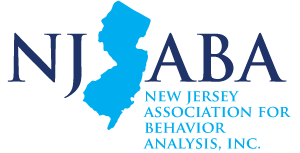As the Events Co-Chairs, Erin Richard White, Ph.D., BCBA-D and Marlene Brown, M.S., BCBA, LBA-NY compiled this information. Please feel free to reach out with your ideas, questions, and more.
Within this section, you can expect to find:

Welcome to the 2023 NJABA Conference!
We are also offering a pre-Conference Workshop on March 2, 2023 with Invited Speaker, Tyra P. Sellers, J.D., Ph.D., BCBA-D, from 2-5pm. Immediately following the workshop, we invite you to join us for a small Reception from 5-6:30pm. Both events are available for in-person attendance only.
All events will take place at The Palace at Somerset Park.
Keynote Speaker: Janet A. Twyman, Ph.D., BCBA, LBA-NY
Janet is an education innovator, thought leader, and founder of blast: a learning sciences company which creates and evaluates K-12 and higher education digital learning programs, identifies metrics for virtual learning, and provides training to educational organizations. Always an educator, Janet been a preschool and elementary teacher, school principal and administrator, university professor, instructional designer, distance learning architect, and educational consultant. Currently an Associate Prof. of Pediatrics at the UMass Chan Medical School, she formerly served as Director of Innovation & Technology for the U.S. Dept. of Ed. funded Center on Innovations in Learning. As V.P. of Instructional Development, Research, & Implementation at Headsprout, she and colleagues created internet-based early reading programs that have garnered several national and international awards. Janet has presented to/worked with education organizations in over 75 states and countries, including speaking about technologies for diverse learners and settings at the United Nations. She has published and presented widely on instructional design, virtual/remote learning and technology, and systems to produce meaningful differences in learners’ lives. In 2008 she served as the President of ABAI and in 2014 was named an ABAI Fellow. For her distinguished contributions to education she has received both the Wing Award for Evidence-based Education and the APA Div. 25 Fred Keller Behavioral Education Award.
![jstwyman2019[2]](https://njaba.org/wp-content/uploads/2022/08/jstwyman20192.jpg)
Presentation: Future Forward – Fusing Behavior Analysis, Technology, and Education
Abstract:
Behavior analysis has had a role in effective, efficient education “technology” since Skinner’s development of the teaching machine in the 1950’s. Major contributions in behavioral education—such as Skinner’s technology of teaching, Keller’s personalized systems of instruction, Markle’s instructional design and concept formation, Lindsley’s precision teaching, Heward’s active student responding, Johnson & Layng’s generative instruction—have provided a foundation for meaningful, system-wide change in teaching and learning. The worldwide pivot to virtual instruction and the growth in applications of artificial intelligence, coupled with substantial changes in education policy and practice (such as personalized learning and competency-based education) make critical features of behavior analysis even more relevant. The explosion of digital technologies, an increased understanding of their capabilities, and a newfound emphasis on measurement and analytics enhance our ability to improve student learning and enhance teacher expertise. Behavior analysts can leverage advances in learning science and digital tools to make teaching and learning more efficient, more effective, more enjoyable, and applicable to a larger set of learning areas. We will examine various instructional technology tools while discussing the congruence between behavior analysis and enhanced opportunities in education to achieve better outcomes for all.
CE Learning Objectives:
- Given a description of current context, participants will describe a current educational trend (e.g., remote learning, competency-based education, embedded assessment, intelligent instruction & adaptation) and how it relates to behavior analysis.
- Given an overview of research-based best practices, participants will state at least three considerations in selecting and evaluating technology for instruction and autism intervention.
- Given a demonstration of various instructional technology tools, participants will identify at least three technology tools containing behavioral features that they can use in their current teaching or learning environments.
- Given a discussion of the changing digital world, participants will identify current and future opportunities for behavior analysts outside of traditional settings.
Pre-Conference Workshop
Ethical Supervision – Practical considerations for what you do and what you teach
Abstract:
Individuals certified by the Behavior Analyst Certification Board® (BACB®) must comply with specific requirements, including adherence with the Professional and Ethical Compliance Code for Behavior Analysis (BACB, 2020), the RBT Code of Ethics (2.0) (BACB, 2020), and accruing continuing education units specifically in supervision each renewal cycle. However, many behavior analysts receive little, if any, direct instruction on how to provide effective, ethical supervision in compliance with the Ethics Code for Behavior Analysts. The first part of the workshop focuses on developing on practical strategies for developing a deeper understanding of section 4.0 Responsibilities to Supervisees and Trainees and considerations to support ethical supervisory practices. The second part of the workshop focuses on how to systematically incorporate ethics, in a functional manner, into the supervised training experience.
LEARNING OBJECTIVES FOR PARTICIPANTS:
Presenter:

Tyra P. Sellers, J.D., Ph.D., BCBA-D
BCBA# 1-03-1167
Affiliation: TP Sellers, LLC
Tyra P. Sellers is the owner of TP Sellers, LLC. She earned a B.A. in Philosophy and M.A. in Special Education from San Francisco State University, a J.D. from the University of San Francisco, a Ph.D. from Utah State University, and is a Board Certified Behavior Analyst®. Her professional and research interests focus on professional ethics, training and supervision, assessment and treatment of severe problem behavior, and variability. Dr. Sellers has over 20 years of clinical experience working with individuals with disabilities in a wide variety of settings. She has held a variety of positions, including Regional Director at a large provider agency, Assistant Professor at Utah State University, and as the Director of Ethics at the Behavior Analyst Certification Board®. She has published several journal articles, four co-authored book chapters, co-authored the book titled Building and Sustaining Meaningful and Effective Relationships As A Supervisor and Mentor and co-authored the workbook pair titled The New Supervisor Workbook and The Consulting Supervisor’s Workbook. She currently serves on the editorial boards for several journals.

The Award will be presented to the recipient at the Annual Conference on Friday, March 3, 2023.

